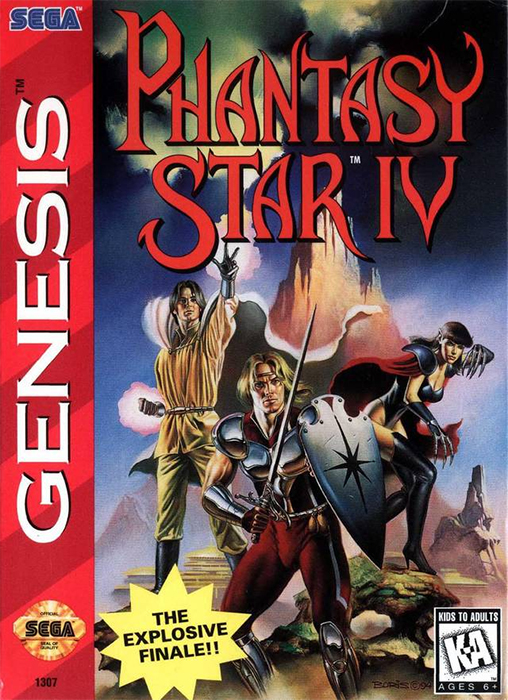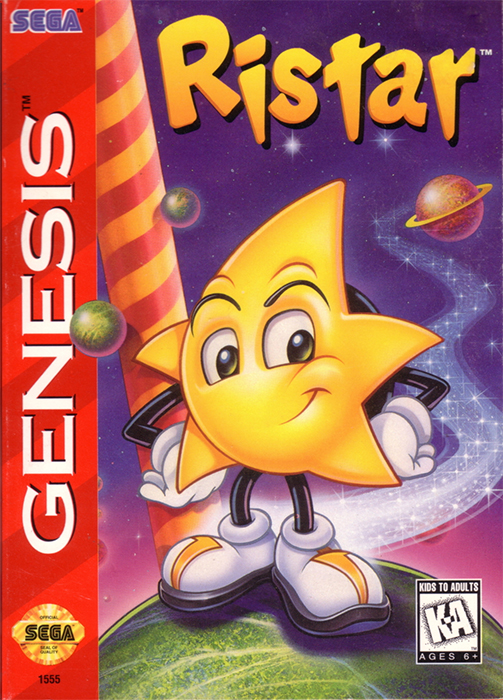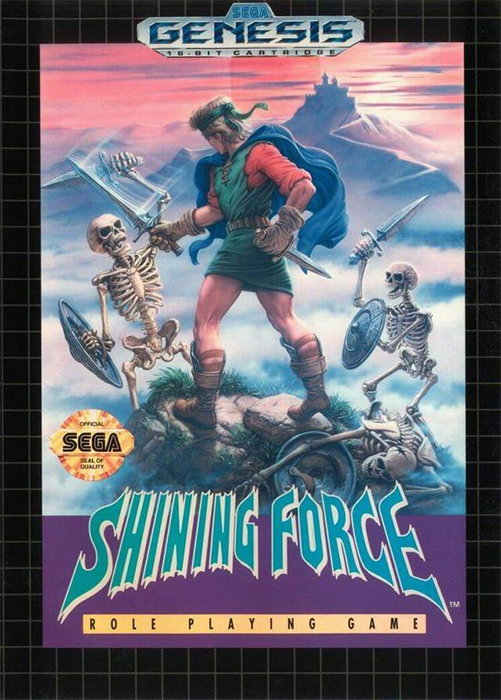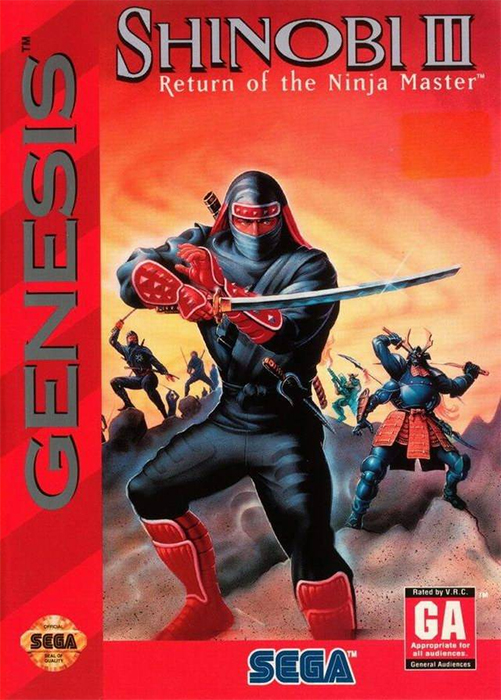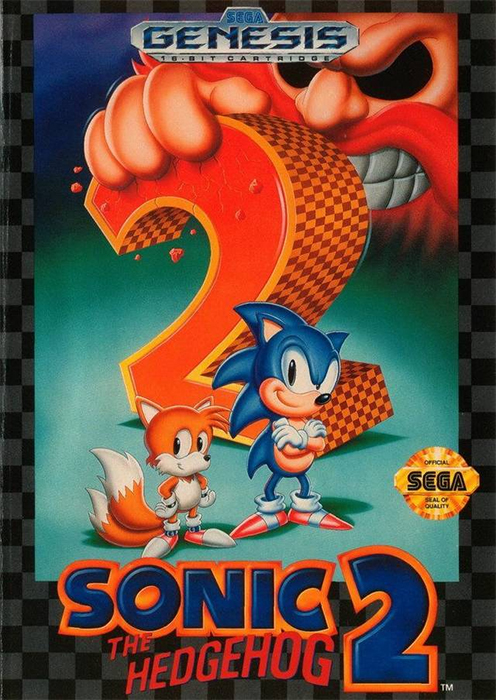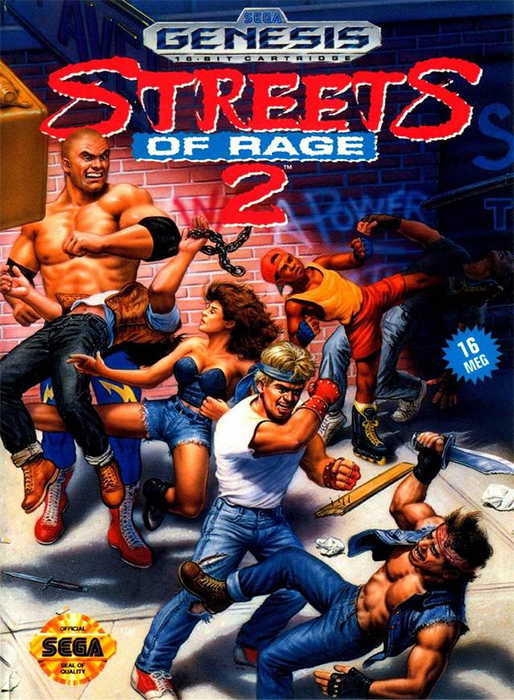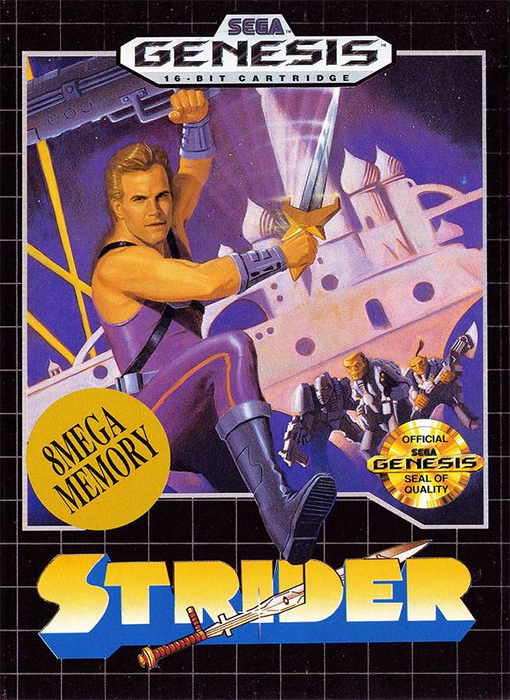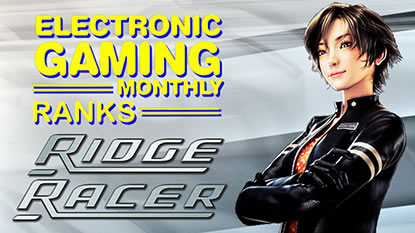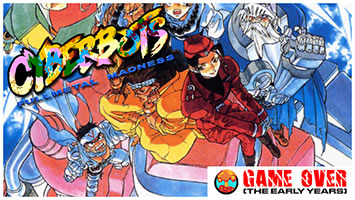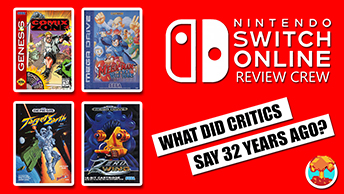- CLASSIC MAGAZINES
- REVIEW CREW
A show recapping what critics thought back
when classic games first came out! - NEXT GENERATION'S BEST & WORST
From the worst 1-star reviews to the best
5-stars can offer, this is Next Generation! - NINTENDO POWER (ARCHIVE)
Experience a variety of shows looking at the
often baffling history of Nintendo Power! - MAGAZINE RETROSPECTIVE
We're looking at the absolutely true history of
some of the most iconic game magazines ever! - SUPER PLAY'S TOP 600
The longest and most ambitious Super NES
countdown on the internet! - THEY SAID WHAT?
Debunking predictions and gossip found
in classic video game magazines! - NEXT GENERATION UNCOVERED
Cyril is back in this spin-off series, featuring the
cover critic review the art of Next Generation! - HARDCORE GAMER MAGAZING (PDF ISSUES)
Download all 36 issues of Hardcore Gamer
Magazine and relive the fun in PDF form!
- REVIEW CREW
- ELECTRONIC GAMING MONTHLY
- ELECTRONIC GAMING MONTHLY RANKS
From Mario to Sonic to Street Fighter, EGM
ranks classic game franchises and consoles! - ELECTRONIC GAMING MONTHLY BEST & WORST
Counting down EGM’s best and worst reviews
going year by year, from 1989 – 2009! - ELECTRONIC GAMING BEST & WORST AWARDS
11-part video series chronicling the ups and
downs of EGM’s Best & Worst Awards!
- ELECTRONIC GAMING MONTHLY RANKS
- GAME HISTORY
- GAME OVER: STORY BREAKDOWNS
Long-running series breaking down game
stories and analyzing their endings! - A BRIEF HISTORY OF GAMING w/ [NAME HERE]
Real history presented in a fun and pithy
format from a variety of game historians! - THE BLACK SHEEP
A series looking back at the black sheep
entries in popular game franchises! - INSTANT EXPERT
Everything you could possibly want to know
about a wide variety of gaming topics! - FREEZE FRAME
When something familiar happens in the games
industry, we're there to take a picture! - I'VE GOT YOUR NUMBER
Learn real video game history through a series
of number-themed episodes, starting at zero! - GREAT MOMENTS IN BAD ACTING
A joyous celebration of some of gaming's
absolute worst voice acting!
- GAME OVER: STORY BREAKDOWNS
- POPULAR SHOWS
- DG NEWS w/ LORNE RISELEY
Newsman Lorne Riseley hosts a regular
series looking at the hottest gaming news! - REVIEW REWIND
Cyril replays a game he reviewed 10+ years
ago to see if he got it right or wrong! - ON-RUNNING FEUDS
Defunct Games' longest-running show, with
editorials, observations and other fun oddities! - DEFUNCT GAMES QUIZ (ARCHIVE)
From online quizzes to game shows, we're
putting your video game knowledge to the test!- QUIZ: ONLINE PASS
Take a weekly quiz to see how well you know
the news and current gaming events! - QUIZ: KNOW THE GAME
One-on-one quiz show where contestants
find out if they actually know classic games! - QUIZ: THE LEADERBOARD
Can you guess the game based on the classic
review? Find out with The Leaderboard!
- QUIZ: ONLINE PASS
- DEFUNCT GAMES VS.
Cyril and the Defunct Games staff isn't afraid
to choose their favorite games and more! - CYRIL READS WORLDS OF POWER
Defunct Games recreates classic game
novelizations through the audio book format!
- DG NEWS w/ LORNE RISELEY
- COMEDY
- GAME EXPECTANCY
How long will your favorite hero live? We crunch
the numbers in this series about dying! - VIDEO GAME ADVICE
Famous game characters answer real personal
advice questions with a humorous slant! - FAKE GAMES: GUERILLA SCRAPBOOK
A long-running series about fake games and
the people who love them (covers included)! - WORST GAME EVER
A contest that attempts to create the worst
video game ever made, complete with covers! - LEVEL 1 STORIES
Literature based on the first stages of some
of your favorite classic video games! - THE COVER CRITIC
One of Defunct Games' earliest shows, Cover
Critic digs up some of the worst box art ever! - COMMERCIAL BREAK
Take a trip through some of the best and
worst video game advertisements of all time! - COMIC BOOK MODS
You've never seen comics like this before.
A curious mix of rewritten video game comics!
- GAME EXPECTANCY
- SERIES ARCHIVE
- NINTENDO SWITCH ONLINE ARCHIVE
A regularly-updated list of every Nintendo
Switch Online release, plus links to review! - PLAYSTATION PLUS CLASSIC ARCHIVE
A comprehensive list of every PlayStation
Plus classic release, including links! - RETRO-BIT PUBLISHING ARCHIVE
A regularly-updated list of every Retro-Bit
game released! - REVIEW MARATHONS w/ ADAM WALLACE
Join critic Adam Wallace as he takes us on a
classic review marathon with different themes!- DEFUNCT GAMES GOLF CLUB
Adam Wallace takes to the links to slice his way
through 72 classic golf game reviews! - 007 IN PIXELS
Adam Wallace takes on the world's greatest spy
as he reviews 15 weeks of James Bond games! - A SALUTE TO VAMPIRES
Adam Wallace is sinking his teeth into a series
covering Castlevania, BloodRayne and more! - CAPCOM'S CURSE
Adam Wallace is celebrating 13 days of Halloween
with a line-up of Capcom's scariest games! - THE FALL OF SUPERMAN
Adam Wallace is a man of steel for playing
some of the absolute worst Superman games! - THE 31 GAMES OF HALLOWEEN
Adam Wallace spends every day of October afraid
as he reviews some of the scariest games ever! - 12 WEEKS OF STAR TREK
Adam Wallace boldly goes where no critic has
gone before in this Star Trek marathon!
- DEFUNCT GAMES GOLF CLUB
- DAYS OF CHRISTMAS (ARCHIVE)
Annual holiday series with themed-episodes
that date all the way back to 2001!- 2015: 30 Ridiculous Retro Rumors
- 2014: 29 Magazines of Christmas
- 2013: 29 Questionable Power-Ups of Christmas
- 2012: 34 Theme Songs of Christmas
- 2011: 32 Game Endings of Christmas
- 2010: 31 Bonus Levels of Christmas
- 2009: 30 Genres of Christmas
- 2008: 29 Controls of Christmas
- 2007: 34 Cliches of Christmas
- 2006: 33 Consoles of Christmas
- 2005: 32 Articles of Christmas
- 2004: 31 Websites of Christmas
- 2003: 29 Issues of Christmas
- 2002: 28 Years of Christmas
- 2001: 33 Days of Christmas
- NINTENDO SWITCH ONLINE ARCHIVE
- REVIEW ARCHIVE
- FULL ARCHIVE
Nintendo Switch Online: 1990s Critics Review Genesis Launch Games - Part 2
Yesterday, Nintendo launched a brand-new Expansion Pack for the Nintendo Switch Online service, which introduced nine Nintendo 64 games and fourteen Genesis games to the retro line-up. To celebrate, we started looking at the 16-bit titles hitting the service, which included everything from Golden Axe to Gunstar Heroes. Today, we're going to dive into the second half of the Genesis line-up, which is where almost all of the heavy hitters are located. I'm talking Sonic, Phantasy Star, Streets of Rage, Strider and even Shinobi. Join me as I flip through the pages of classic magazines like Electronic Gaming Monthly, Die Hard Game Fan, Mean Machines Sega, GamePro and more to see what old school critics thought of these games when they first came out. This is the Nintendo Switch Online Review Crew.
From the moment the Nintendo Switch Online Expansion Pack was announced, you saw the chorus of people complaining that it's overpriced. If you want to talk about expensive, then look no further than the first game we're going to talk about today -- Phantasy Star IV. When this 3-megabyte game was first released in 1995, it retailed for an astonishing $100. To put that in perspective, that would be $180 in 2021, if you adjust for inflation. You would think that the high price might dominate the discussion, but GamePro barely mentions it. Instead they focus on the static intro with scrolling text: "Phantasy Star IV is the latest installment in the mother of all Genesis RPGs, yet it never gives you the sense that you're about to embark on something special." They ultimately gave it a 4 out of 5 and called it "amazingly rich in detail" and the kind of game you'll lose sleep over.
Next Generation disagreed and compared it to what Square was doing at the time. "Since the Phantasy Star 1 and 2 heyday, The Secret of Mana and the Final Fantasy games have pushed the genre to new limits and innovation and incredible graphic detail. Phantasy Star IV, while still a good game, is years behind. With nothing that goes above or beyond the previous titles, the future of this series isn't very bright." Leave it to Die Hard Game Fan to go the complete opposite direction, with Nick Rox surprising nobody with an inflated score of 97%. "The ultimate Sega RPG has finally arrived. Although it was mis-translated and has little connection to the previous games because of this, the game itself is the same and is undeniably one of the greatest RPGs ever fashioned." Nick's colleague K. Lee agreed, arguing that "this game is the Genesis Final Fantasy III." I don't disagree, but I am curious why Game Fan chose not to score the gameplay. Do JRPGs not have gameplay? Weird. Even though Phantasy Star IV has its fair share of problems, I'm just happy to see an epic role-playing game included in the Expansion Pack.
Six years into the system's life and mere months before the Saturn's debut, Sega decided to once again wade into the cutesy mascot character waters with a delightful platformer named Ristar. With gorgeous graphics and a likable hero, you have to believe that Sega expected big things from this cartoony star. Unfortunately, it was completely overshadowed by the impending 32-bit war and the recent release of Sonic & Knuckles, which means that there's a good chance that many gamers will play it for the first time on their Switch. I consider this good news and, based on the reviews, so would Die Hard Game Fan. Predictably, they couldn't contain their excitement, with Nick Rox giving it a 98% and calling it "one of the greatest Genesis games ever programmed. Every aspect was handled perfectly, from the remarkable graphics and excellently composed BGM to perfect control." Skid also liked the game, but could tell that it was being overshadowed: "This game should be getting MUCH MORE hype."
Next Generation also loved Ristar. I mean, they still gave it a 3 out of 5 simply because it was on an older console, but they straight-up call it "much more than just another cutesy mascot in another cutesy platform game, Ristar is one of the best platform games to date." They noted that it borrowed heavily from Treasure's Dynamite Headdy, "but it still contains enough original gameplay, solid action and fun to escape the copy-cat label and be one of 1995's more promising games." You saw a similar score from Game Players, who gave it a 79%, as well as an 84% from Mean Machines Sega. GamePro raved that "beautiful graphics and fun gameplay help make this an auspicious debut for Sega's newest hop-n-bop star." Despite solid scores and gorgeous graphics, Ristar was a one-and-done hero. It's a shame, because I would have loved to have seen a 32-bit sequel on the Saturn.
One thing that I like about the selection of Genesis games we're getting is that not only is there a nice variety of genres, but we are also getting multiple versions of those genres done in different ways. We get the popular Sonic 2, as well as the lesser-known Ristar. We get fantasy brawling with Golden Axe, as well as bare-knuckle back alley fighting in Streets of Rage 2. We get the hardcore seriousness of Contra, as well as the more light-hearted run 'n gun shooting of Gunstar Heroes. The same is true when it comes to our role-playing game choices. We get the traditional turn-based Japanese role-playing game with Phantasy Star IV, as well as the more strategy-driven Shining Force. I'm here to tell you to not sleep on Shining Force, especially if you're a fan of Nintendo's Fire Emblem series. This is a fun tactical RPG that holds up better than you might expect.
GamePro also namechecked Phantasy Star in their review, but not the fourth installment: "Shining Force won't dethrone the current king of Genesis RPGs, Phantasy Star II, but it's packed with enough quests and characters to satisfy your role-playing appetite." Mean Machines Sega was one of the game's biggest cheerleaders, calling it "a beautifully crafted piece of Megadrive software with just the right balance of action and adventure to satisfy all needs. There's just something about Shining Force that makes it a classic game and there's no competition for it in the Megadrive's RPG range." Mega Play wasn't ready to go that high, but Martin Alessi still enjoyed the adventure: "Shining Force is one of the better RPGs on the Genesis lately. The music is a disappointment and the tracks are extremely repetitive, especially during the overdrawn battle scenes." That said, the long quest and sharp graphics earned Shining Force a 73%. That's not exactly a huge endorsement, but I say give the game a look. If you're a fan of tactical RPGs, I think you'll dig it.
If you ask me, Shinobi III: Return of the Ninja Master is easily one of the five best Genesis games ever made. Hell, maybe even top three. But you didn't come here for my rankings, you want to know what the critics said, and boy are there are a lot of reviews for Shinobi III. Let's start with Die Hard Game Fan, who you already know is going to back up my love for this amazing ninja game. The Enquirer gave the game a 94% and raved that "everything in this game screams MORE! More color, more action, more graphic FX, more game play elements and, of course, more music. A must for all Genesis owners." Skid used his review to note the advancements that had come to 16-bit game development: "The third in the series is by far the best, accurately representing just how far the Genesis has come in just three years."
Believe it or not, GamePro actually liked Shinobi III more than Die Hard Game Fan. "Just when you were getting bored with similar-looking-and-playing action games, along comes Joe Musashi to shake things up. Mind-blowing backgrounds, great new moves, a horse-riding sequence and hot music push the Genesis to the max. Three cheers for Shinobi III." Electronic Gaming Monthly also loved the game, with all four editors giving it a 9 out of 10. "The third Shinobi game is by far the best in the series. The game play is fantastic with his new attacks and killer magic, all requiring some technique. This game is loaded with huge bosses, some with cool warping effects to make it look even more real." Across the pond, the British critics held back more than their American counterparts. Mean Machines Sega, for example, gave it an 89%, while Computer & Video Games went lower with an 82%. However, the lowest score comes from Sega Force Mega, where Mark gave it a 79% and complained that "unless you are a real big fan of the earlier games and you already own one of them, then you may find that this is possibly too reminiscent of those adventures." Too reminiscent of previous Shinobi games? I wonder if he means Shadow Dancer or The Revenge of Shinobi? Or maybe The Cyber Shinobi? Yeah, I think the game is way better than Marc says. To the max.
Ladies and gentlemen, with only three games left, we are at the peak of the pack. You aren't going to find any bad reviews going forward, especially when it comes to our next game -- Sonic the Hedgehog 2. I think it's safe to say that this was one of the most anticipated sequels of the 16-bit era, and Sega did not disappoint. Critics were quick to heap praise of this platforming masterpiece, with many considering it the best game in the Sonic franchise. One of those magazines was GamePro, who gave it a 5 out of 5 and called it "fabulous gaming" that is actually better than the original. "There's enough stuff that's new and different in Sonic 2 to make it a must-have cart for fans of the original. Probably the best thing about Sonic 2 is that it's just plain fun. Beginning and hardcore gamers alike will enjoy this fast-paced romp with His Hedgehogness and Tails."
The UK mags were especially susceptible to Sonic 2's charm, as you saw almost identical scores from all the top critics. For example, Mega gave it a 94%, while Sega Force went all the way up to 97% for this one. Mean Machines Sega settled on 96%, concluding that "Sonic has outdone himself. An absolute gem of a game which your Megadrive will be screaming out for. Brilliant! If you miss Sonic II, you should be committed to a loony bin." What surprised me is that Electronic Gaming Monthly was one of the most critical of the sequel, with Sonic 2 earning an average score of 8.75 out of 10. While Ed gave it a perfect 10 out of 10 and called Sonic 2 "the best all-round game on the market," both Steve and Martin gave it eights. Martin griped that it's "not linear, but still too straight-forward" and Steve called the "play was a little disjointed." But even with EGM's slightly lower takes, Sonic 2 remains one of the best-reviewed Genesis games of all time.
If you're looking for a great beat 'em up on the Genesis, you won't find one better than Streets of Rage 2. That's not a controversial opinion. While I'm sure there are people who prefer the fantasy world of Golden Axe or playing as Frank Castle in The Punisher, few people are making the case that those games are better than Streets of Rage 2. Nor should they, because this is one of the best Genesis games ever made. Jaz over at Mean Machines Sega loved that this game showed off what the 16-bit hardware was capable of: "Streets of Rage II is the ultimate cartridge beat 'em up on the Megadrive. The graphics are superb, with huge sprites and great animation. There's also loads of enemies attacking at once. Sound and presentation are of an equally high standard, and the gameplay is just superb, especially in two-player team mode. You couldn't want more from a beat 'em up."
GamePro also loved the game, giving it a 5 out of 5 and comparing it to the other brawlers on the market: "Stacked against the Final Fights and Super Double Dragons of the world, Streets of Rage 2 more than fends for itself. Sixteen megabits of great, improved graphics, massive sprites, top-notch audio and multitudes of moves make it the 165-bit side-scrolling street fighter to beat." I love how nobody caught the "165-bit" thing before the issue went to print. While Electronic Gaming Monthly didn't review Streets of Rage 2, their Sega-themed spin-off magazine, Mega Play, certainly did. They were surprisingly low on the game, especially when compared to their colleagues. Howard called it "a solid action fighting with a good variety of moves and weapons. However, I found that the special moves gave you too much strength and made the game too easy." Martin gave it a slightly higher score, but still complained that the action is too repetitive. That's certainly a criticism that could be levied against pretty much every beat 'em up of that era, including Final Fight. Speaking of which, if you want to see more brawler reviews, you should watch me compare the reviews of the Streets of Rage series to those of the Final Fight series and see who won. It's a few years old, but definitely worth your time.
Before Sonic the Hedgehog, Streets of Rage and Gunstar Heroes, the Genesis killer app was Strider. A port of the popular arcade game by Capcom, this was one of the 16-bit system's first major hits, both critically and commercially. It was the must-own game in 1990, and not just because it was the first Genesis game to use 8 megabits of memory, which translates to a whopping 1 megabyte. That may not sound all that impressive thirty years later, but I assure you that Strider was a big deal. Computers & Video Games grumbled about the high price point, but argued that it is well worth the expense: "We've consulted experts on the matter and the word is that Megadrive Strider IS arcade Strider! The graphics and sound are exactly the same as the arcade, as is the brilliant playability. We're talking about an utterly fantastic platform game here -- definitely the greatest yet seen on Sega's 16-bit wonder machine. You're pretty much getting three thousand quid's worth of arcade machine for forty-one notes, so you can't really complain, can you?"
While CVG's score was higher than most, you definitely saw similar takes from the usual suspects. Sega Pro gave it a 92%, while MegaTech went one tick lower with 91%. Mean Machines Sega gave it a 90% and called it "a lavish beat 'em up, and an absolutely cracking conversion that's identical to the coin-op in almost every way." His one complaint? There just aren't enough levels: "The one failing it has is the comparative lack of levels. Five just isn't enough." Back in the States, Electronic Gaming Monthly liked it so much that all four of their editors gave it nines, leading the magazine to name it the Best Game of 1990. It also picked up the prize for Best Graphics and helped lead the Genesis to winning the Best Video Game System prize. In case you're wondering, the lowest score I could find was GamePro's 4 out of 5. This ran back in their December 1990 issue, which was only three months after they first started scoring their reviews. This was a time when they were more interested in punny phrasing than hard-hitting critique, which may explain why they ended their review with: "What more is there to say -- you'll take this one in stride!" That's not great, but Strider is, and that's why it should be one of the first games you play when you subscribe to Nintendo's new Expansion Pack.
| Publication | Scores |
|---|---|
| Die Hard Game Fan | 93% |
| GamePro | 4/5 |
| Electronic Gaming Monthly | 7.75/10 |
| Next Generation | 3/5 |
| AVERAGE SCORE | 78% |
Next Generation disagreed and compared it to what Square was doing at the time. "Since the Phantasy Star 1 and 2 heyday, The Secret of Mana and the Final Fantasy games have pushed the genre to new limits and innovation and incredible graphic detail. Phantasy Star IV, while still a good game, is years behind. With nothing that goes above or beyond the previous titles, the future of this series isn't very bright." Leave it to Die Hard Game Fan to go the complete opposite direction, with Nick Rox surprising nobody with an inflated score of 97%. "The ultimate Sega RPG has finally arrived. Although it was mis-translated and has little connection to the previous games because of this, the game itself is the same and is undeniably one of the greatest RPGs ever fashioned." Nick's colleague K. Lee agreed, arguing that "this game is the Genesis Final Fantasy III." I don't disagree, but I am curious why Game Fan chose not to score the gameplay. Do JRPGs not have gameplay? Weird. Even though Phantasy Star IV has its fair share of problems, I'm just happy to see an epic role-playing game included in the Expansion Pack.
| Publication | Scores |
|---|---|
| Die Hard Game Fan | 90% |
| Mean Machines Sega | 84% |
| GamePro | 4/5 |
| Next Generation | 3/5 |
| AVERAGE SCORE | 79% |
Next Generation also loved Ristar. I mean, they still gave it a 3 out of 5 simply because it was on an older console, but they straight-up call it "much more than just another cutesy mascot in another cutesy platform game, Ristar is one of the best platform games to date." They noted that it borrowed heavily from Treasure's Dynamite Headdy, "but it still contains enough original gameplay, solid action and fun to escape the copy-cat label and be one of 1995's more promising games." You saw a similar score from Game Players, who gave it a 79%, as well as an 84% from Mean Machines Sega. GamePro raved that "beautiful graphics and fun gameplay help make this an auspicious debut for Sega's newest hop-n-bop star." Despite solid scores and gorgeous graphics, Ristar was a one-and-done hero. It's a shame, because I would have loved to have seen a 32-bit sequel on the Saturn.
| Publication | Scores |
|---|---|
| Mean Machines Sega | 91% |
| GamePro | 4.5/5 |
| Video Games & Computer Entertainment | 7.4/10 |
| Mega Play | 73% |
| AVERAGE SCORE | 82% |
GamePro also namechecked Phantasy Star in their review, but not the fourth installment: "Shining Force won't dethrone the current king of Genesis RPGs, Phantasy Star II, but it's packed with enough quests and characters to satisfy your role-playing appetite." Mean Machines Sega was one of the game's biggest cheerleaders, calling it "a beautifully crafted piece of Megadrive software with just the right balance of action and adventure to satisfy all needs. There's just something about Shining Force that makes it a classic game and there's no competition for it in the Megadrive's RPG range." Mega Play wasn't ready to go that high, but Martin Alessi still enjoyed the adventure: "Shining Force is one of the better RPGs on the Genesis lately. The music is a disappointment and the tracks are extremely repetitive, especially during the overdrawn battle scenes." That said, the long quest and sharp graphics earned Shining Force a 73%. That's not exactly a huge endorsement, but I say give the game a look. If you're a fan of tactical RPGs, I think you'll dig it.
| Publication | Scores |
|---|---|
| GamePro | 5/5 |
| Die Hard Game Fan | 92% |
| Electronic Gaming Monthly | 9/10 |
| Mean Machines Sega | 89% |
| Computer & Video Games | 82% |
| Sega Force Mega | 80% |
| AVERAGE SCORE | 89% |
Believe it or not, GamePro actually liked Shinobi III more than Die Hard Game Fan. "Just when you were getting bored with similar-looking-and-playing action games, along comes Joe Musashi to shake things up. Mind-blowing backgrounds, great new moves, a horse-riding sequence and hot music push the Genesis to the max. Three cheers for Shinobi III." Electronic Gaming Monthly also loved the game, with all four editors giving it a 9 out of 10. "The third Shinobi game is by far the best in the series. The game play is fantastic with his new attacks and killer magic, all requiring some technique. This game is loaded with huge bosses, some with cool warping effects to make it look even more real." Across the pond, the British critics held back more than their American counterparts. Mean Machines Sega, for example, gave it an 89%, while Computer & Video Games went lower with an 82%. However, the lowest score comes from Sega Force Mega, where Mark gave it a 79% and complained that "unless you are a real big fan of the earlier games and you already own one of them, then you may find that this is possibly too reminiscent of those adventures." Too reminiscent of previous Shinobi games? I wonder if he means Shadow Dancer or The Revenge of Shinobi? Or maybe The Cyber Shinobi? Yeah, I think the game is way better than Marc says. To the max.
| Publication | Scores |
|---|---|
| GamePro | 5/5 |
| Sega Force | 97% |
| Mean Machines Sega | 96% |
| Mega | 94% |
| Video Games & Computer Entertainment | 9/10 |
| Electronic Gaming Monthly | 8.75/10 |
| AVERAGE SCORE | 94% |
The UK mags were especially susceptible to Sonic 2's charm, as you saw almost identical scores from all the top critics. For example, Mega gave it a 94%, while Sega Force went all the way up to 97% for this one. Mean Machines Sega settled on 96%, concluding that "Sonic has outdone himself. An absolute gem of a game which your Megadrive will be screaming out for. Brilliant! If you miss Sonic II, you should be committed to a loony bin." What surprised me is that Electronic Gaming Monthly was one of the most critical of the sequel, with Sonic 2 earning an average score of 8.75 out of 10. While Ed gave it a perfect 10 out of 10 and called Sonic 2 "the best all-round game on the market," both Steve and Martin gave it eights. Martin griped that it's "not linear, but still too straight-forward" and Steve called the "play was a little disjointed." But even with EGM's slightly lower takes, Sonic 2 remains one of the best-reviewed Genesis games of all time.
| Publication | Scores |
|---|---|
| GamePro | 5/5 |
| Sega Force | 93% |
| Mean Machines Sega | 92% |
| Mega Play | 8.4/10 |
| AVERAGE SCORE | 93% |
GamePro also loved the game, giving it a 5 out of 5 and comparing it to the other brawlers on the market: "Stacked against the Final Fights and Super Double Dragons of the world, Streets of Rage 2 more than fends for itself. Sixteen megabits of great, improved graphics, massive sprites, top-notch audio and multitudes of moves make it the 165-bit side-scrolling street fighter to beat." I love how nobody caught the "165-bit" thing before the issue went to print. While Electronic Gaming Monthly didn't review Streets of Rage 2, their Sega-themed spin-off magazine, Mega Play, certainly did. They were surprisingly low on the game, especially when compared to their colleagues. Howard called it "a solid action fighting with a good variety of moves and weapons. However, I found that the special moves gave you too much strength and made the game too easy." Martin gave it a slightly higher score, but still complained that the action is too repetitive. That's certainly a criticism that could be levied against pretty much every beat 'em up of that era, including Final Fight. Speaking of which, if you want to see more brawler reviews, you should watch me compare the reviews of the Streets of Rage series to those of the Final Fight series and see who won. It's a few years old, but definitely worth your time.
| Publication | Scores |
|---|---|
| Video Games & Computer Entertainment | 95% |
| Sega Pro | 92% |
| MegaTech | 91% |
| Electronic Gaming Monthly | 9/10 |
| Mean Machines Sega | 90% |
| GamePro | 4/5 |
| AVERAGE SCORE | 90% |
While CVG's score was higher than most, you definitely saw similar takes from the usual suspects. Sega Pro gave it a 92%, while MegaTech went one tick lower with 91%. Mean Machines Sega gave it a 90% and called it "a lavish beat 'em up, and an absolutely cracking conversion that's identical to the coin-op in almost every way." His one complaint? There just aren't enough levels: "The one failing it has is the comparative lack of levels. Five just isn't enough." Back in the States, Electronic Gaming Monthly liked it so much that all four of their editors gave it nines, leading the magazine to name it the Best Game of 1990. It also picked up the prize for Best Graphics and helped lead the Genesis to winning the Best Video Game System prize. In case you're wondering, the lowest score I could find was GamePro's 4 out of 5. This ran back in their December 1990 issue, which was only three months after they first started scoring their reviews. This was a time when they were more interested in punny phrasing than hard-hitting critique, which may explain why they ended their review with: "What more is there to say -- you'll take this one in stride!" That's not great, but Strider is, and that's why it should be one of the first games you play when you subscribe to Nintendo's new Expansion Pack.
HOME |
CONTACT |
NOW HIRING |
WHAT IS DEFUNCT GAMES? |
NINTENDO SWITCH ONLINE |
RETRO-BIT PUBLISHING
Retro-Bit |
Switch Planet |
The Halcyon Show |
Same Name, Different Game |
Dragnix |
Press the Buttons
Game Zone Online | Hardcore Gamer | The Dreamcast Junkyard | Video Game Blogger
Dr Strife | Games For Lunch | Mondo Cool Cast | Boxed Pixels | Sega CD Universe | Gaming Trend
Game Zone Online | Hardcore Gamer | The Dreamcast Junkyard | Video Game Blogger
Dr Strife | Games For Lunch | Mondo Cool Cast | Boxed Pixels | Sega CD Universe | Gaming Trend
Copyright © 2001-2025 Defunct Games
All rights reserved. All trademarks are properties of their respective owners.
All rights reserved. All trademarks are properties of their respective owners.







